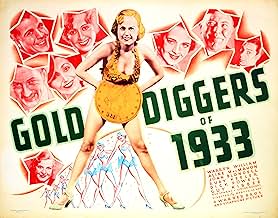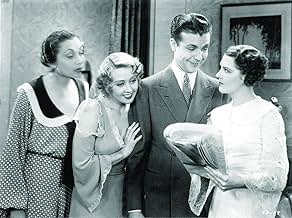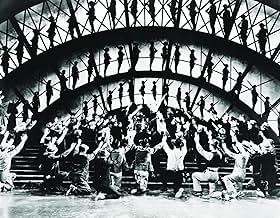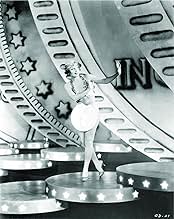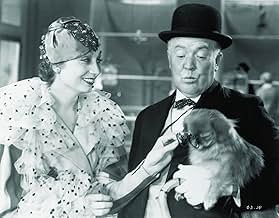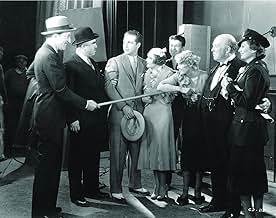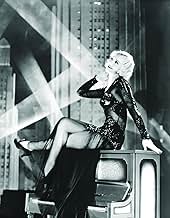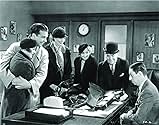AVALIAÇÃO DA IMDb
7,7/10
9,6 mil
SUA AVALIAÇÃO
Um compositor rico resgata artistas desempregados da Broadway para uma nova obra.Um compositor rico resgata artistas desempregados da Broadway para uma nova obra.Um compositor rico resgata artistas desempregados da Broadway para uma nova obra.
- Direção
- Roteiristas
- Artistas
- Indicado a 1 Oscar
- 4 vitórias e 1 indicação no total
Robert Agnew
- Dance Director
- (não creditado)
Loretta Andrews
- Gold Digger
- (não creditado)
Monica Bannister
- Gold Digger
- (não creditado)
Bonnie Bannon
- Gold Digger
- (não creditado)
Joan Barclay
- Gold Digger
- (não creditado)
Anita Barnes
- Gold Digger
- (não creditado)
Billy Barty
- Baby in 'Pettin' in the Park' Number
- (não creditado)
Busby Berkeley
- Call Boy
- (não creditado)
Bonnie Blackwood
- Chorus girl
- (não creditado)
Eric Blore
- Clubman
- (não creditado)
Avaliações em destaque
I've heard of this movie for years, but didn't actually see it until last week when Turner Classic Movies ran it. And it is positively stunning!! On the surface, it moves almost like a carbon copy of 42ND STREET- right up to the last-minute switch in players before the curtain goes up (although in this film, it's Dick Powell instead of Ruby Keeler). But its astringent look at trying to play Tin Pan Alley smack in the middle of the Depression gives it a very adult and tragic significance. It still has the Berkley dazzle- from the "Shadow Waltz" chorus girls (and electric violins) to the now-legendary "We're In The Money" dress rehearsal fronted by a pre-Astaire Ginger Rogers. (I was a teenager when my mother mentioned that one verse of this song was actually sung in Pig Latin- and I swore for twenty-five years that she was pulling my chain. It is one of the cleverest vocal interludes I've ever seen and heard.) But the three girls implied in the film's title- Ruby Keeler, Aline McMahon, and especially the sharp, smart, and gorgeous Joan Blondell- are the best things in the movie. And Blondell fronts the sublime finale number "Forgotten Man-" which pays tribute to the men (and women) of WWI and the ironies which followed. The staging of it- the marching which goes from triumphant to tragic, the torchy, gospel-like vocal of Etta Moten (the black woman sitting in the window), and the pullback shot of everyone coming downstage at the fadeout- is truly spectacular.
Mervyn LeRoy directs this irresistible and touching depression-era musical. Busby Berkeley's choreography is as breath-taking as ever, as are the bevy of beautiful women in the elaborate productions. Many great musical numbers highlight this film including "We're in the Money" in which a then unknown, Ginger Rogers sings in Pig Latin. A host of other oddities can be found as always when Mr. Berkeley is involved. Ruby Keeler and Dick Powell are sensational as dancing and singing lovebirds and all works out well in the end. The show does close on a noticeably strange note with the very powerful protest number regarding the depression called "Forgotten Man" masterfully delivered by bombshell, Joan Blondell. A truly original and memorable musical.
With the success of "42nd Street," Warner Brothers wasted no time adding Busby Berkeley musical numbers to "Gold Diggers of 1933."
Starring Dick Powell and Ruby Keeler, this musical also has some of the same Depression darkness that permeated "42nd Street." "It's the Depression, dearie," Ginger Rogers says as the show she and her fellow chorines are laboring in closes in rehearsal due to lack of funding.
However, Brad (Powell), a composer in a nearby apartment who's sweet on Polly (Keeler), offers to give Ned Sparks the money he needs to produce his new show. His only condition is that Polly be featured.
Everyone wonders where he got the money, and a news item plus the fact that he refuses to appear in the show make the girls suspicious that he's a bank robber. In fact, he's the scion of a wealthy man (Warren William), who soon appears on the scene with his attorney (Guy Kibbee) when Brad steps in for the lumbago-ridden juvenile lead.
Polly's roommates Trixie and Carol (Joan Blondell and Aline MacMahon) go to work on the two immediately.
Though the film has some fantastic numbers - "We're in the Money," "The Shadow Waltz," "Pettin' in the Park," and great Busby Berkeley choreography, the middle section has no music and drags on as the gals meet the men, get them to pay for expensive hats, etc. This is probably because the film was completed when the musical numbers were added.
But the final number is worth the whole film. "Remember Your Forgotten Man" is a tribute to the World War I soldiers now out of work in the Depression, and not only are the production effects and choreography fantastic, but the singing as well, particularly the solo work by Etta Morton. Blondell, who from the sound of it in Dames was completely tone deaf, is beautifully dubbed here.
Ginger Rogers shines in a supporting role especially with her pig Latin lyrics to "We're in the Money" which were added after she was heard fooling around in a rehearsal. Powell is in gorgeous voice in all the numbers, but "I've Got to Sing a Torch Song" is a high point.
It's easy to watch the dancing, the beautiful women in their costumes, and listen to the singing and forget what in fact was going on in the '30s - after all, that's why these films were made.
But the "Forgotten Man" number serves as a reminder then and today that for the people sitting in the theaters, their troubles were right outside the door.
Starring Dick Powell and Ruby Keeler, this musical also has some of the same Depression darkness that permeated "42nd Street." "It's the Depression, dearie," Ginger Rogers says as the show she and her fellow chorines are laboring in closes in rehearsal due to lack of funding.
However, Brad (Powell), a composer in a nearby apartment who's sweet on Polly (Keeler), offers to give Ned Sparks the money he needs to produce his new show. His only condition is that Polly be featured.
Everyone wonders where he got the money, and a news item plus the fact that he refuses to appear in the show make the girls suspicious that he's a bank robber. In fact, he's the scion of a wealthy man (Warren William), who soon appears on the scene with his attorney (Guy Kibbee) when Brad steps in for the lumbago-ridden juvenile lead.
Polly's roommates Trixie and Carol (Joan Blondell and Aline MacMahon) go to work on the two immediately.
Though the film has some fantastic numbers - "We're in the Money," "The Shadow Waltz," "Pettin' in the Park," and great Busby Berkeley choreography, the middle section has no music and drags on as the gals meet the men, get them to pay for expensive hats, etc. This is probably because the film was completed when the musical numbers were added.
But the final number is worth the whole film. "Remember Your Forgotten Man" is a tribute to the World War I soldiers now out of work in the Depression, and not only are the production effects and choreography fantastic, but the singing as well, particularly the solo work by Etta Morton. Blondell, who from the sound of it in Dames was completely tone deaf, is beautifully dubbed here.
Ginger Rogers shines in a supporting role especially with her pig Latin lyrics to "We're in the Money" which were added after she was heard fooling around in a rehearsal. Powell is in gorgeous voice in all the numbers, but "I've Got to Sing a Torch Song" is a high point.
It's easy to watch the dancing, the beautiful women in their costumes, and listen to the singing and forget what in fact was going on in the '30s - after all, that's why these films were made.
But the "Forgotten Man" number serves as a reminder then and today that for the people sitting in the theaters, their troubles were right outside the door.
This, the first in the series of Gold Diggers films still in existence, is the best, the sparkiest, the funniest, and the strongest. Ruby Keeler, Joan Blondell, Aline MacMahon, Dick Powell, Guy Kibbee, Warren William, Ginger Rogers, and then some ... what a great cast! Wonderful musical numbers with that distinctive Berkeley choreography. A crackling script which still packs a punch now. And, best of all, that wonderful finale 'Forgotten Man', where Great War veterans shuffle through a world that doesn't care while the women left behind remember their happier days ...
This masterpiece from 1933 is one of the best examples I've seen of early Hollywood exploitation, although by today's standards if you didn't already know it was controversial at the time you probably wouldn't notice. With the introduction of the talkies in the late 1920's, Hollywood seemed unable to control various movies using subtle innuendos, and actresses displaying a bit more skin than they should until the Hays Code came into full force in 1934, which enforced the boundaries as to what was deemed acceptable on screen. Gangsters profited from crime, women displayed their legs, and in the case of Gold Diggers Of 1933, women used their sexuality to conquer men and gain what they wanted.
Set during the Depression, it follows a quartet of stage dancers after their show is stopped due to the creative director failing to pay the bills. Things look on the up when the girls are asked to return for a brand new show, which would tackle the effects of the Depression on the common man and the state of the country. The enthusiastic director Barney (Ned Sparks) overhears the girls' neighbour Brad (Dick Powell) crooning a tune playing his piano, and invites him to play more tunes and eventually write the score for the upcoming musical. Barney also needs a lot of money to fund, something that Brad is happy to pay in case, much to the girls' suspicion.
It comes across as a film with two halves - the first focusing on the development of the musical, the relationship between Brad and dancer Polly (Ruby Keeler), and the confusion surrounding the shady Brad's situation. The second seeing fellow dancers Carol (Joan Blondell) and Trixie's (Aline MacMahon) attempts to squeeze as much cash as possible out of Barney's upper-class brother Lawrence (a brilliant Warren William) and bumbling Peabody (Guy Kibbee). The first is a masterclass of beautiful stage numbers, fantastic songs, and good old-fashioned escapism. The second is where the film hits full stride, providing laugh out loud situations and some verbal comedy that wouldn't look out place today, as the girls flirt with and tease the old men as we cheer them on. It's the kind of thing that Sex And The City wishes it could pull off when it isn't being so materialistic and soulless.
When you think it's over it pulls off one last masterstroke in the highly effective 'Remember My Forgotten Man' musical number, as Joan Blondell sings about how her man fought for her country and now begs for food and resorts to picking up discarded cigarette butts, as bloody soldiers march through the street. It's a beautiful moment and really sums up the era. It offers an insight into the whole Pre-Code Hollywood movement, where people would go to the cinema to escape their everyday struggles to see an actress like Blondell revealing a bit more leg than she should, or a Pre-Code veteran such as Warren William sneer his way through some juicy lines and villainous roles. It gave the general public that little something extra to get excited about.
This is a film that has everything, and if you can track it down I would urge you to see it. It's a fascinating time capsule, and even has a very early role for Ginger Rogers as the flirty Fay. It has also been entered into the National Film Registry for preservation by the Library of Congress. A must-see.
www.the-wrath-of-blog.blogspot.com
Set during the Depression, it follows a quartet of stage dancers after their show is stopped due to the creative director failing to pay the bills. Things look on the up when the girls are asked to return for a brand new show, which would tackle the effects of the Depression on the common man and the state of the country. The enthusiastic director Barney (Ned Sparks) overhears the girls' neighbour Brad (Dick Powell) crooning a tune playing his piano, and invites him to play more tunes and eventually write the score for the upcoming musical. Barney also needs a lot of money to fund, something that Brad is happy to pay in case, much to the girls' suspicion.
It comes across as a film with two halves - the first focusing on the development of the musical, the relationship between Brad and dancer Polly (Ruby Keeler), and the confusion surrounding the shady Brad's situation. The second seeing fellow dancers Carol (Joan Blondell) and Trixie's (Aline MacMahon) attempts to squeeze as much cash as possible out of Barney's upper-class brother Lawrence (a brilliant Warren William) and bumbling Peabody (Guy Kibbee). The first is a masterclass of beautiful stage numbers, fantastic songs, and good old-fashioned escapism. The second is where the film hits full stride, providing laugh out loud situations and some verbal comedy that wouldn't look out place today, as the girls flirt with and tease the old men as we cheer them on. It's the kind of thing that Sex And The City wishes it could pull off when it isn't being so materialistic and soulless.
When you think it's over it pulls off one last masterstroke in the highly effective 'Remember My Forgotten Man' musical number, as Joan Blondell sings about how her man fought for her country and now begs for food and resorts to picking up discarded cigarette butts, as bloody soldiers march through the street. It's a beautiful moment and really sums up the era. It offers an insight into the whole Pre-Code Hollywood movement, where people would go to the cinema to escape their everyday struggles to see an actress like Blondell revealing a bit more leg than she should, or a Pre-Code veteran such as Warren William sneer his way through some juicy lines and villainous roles. It gave the general public that little something extra to get excited about.
This is a film that has everything, and if you can track it down I would urge you to see it. It's a fascinating time capsule, and even has a very early role for Ginger Rogers as the flirty Fay. It has also been entered into the National Film Registry for preservation by the Library of Congress. A must-see.
www.the-wrath-of-blog.blogspot.com
Você sabia?
- CuriosidadesDuring rehearsals of "We're in the Money", Ginger Rogers began goofing off and singing in pig Latin. Studio executive Darryl F. Zanuck overheard her, and suggested she do it for real in the movie.
- Erros de gravaçãoWhen Brad plays piano for Mr. Hopkins, his fingers don't match the sound of the piano.
- Citações
Trixie Lorraine: "Fanny" is Faneul H. Peabody, just the kind of man I've been looking for, lots of money and no resistance.
- ConexõesEdited into Busby Berkeley and the Gold Diggers (1969)
- Trilhas sonorasThe Gold Diggers' Song (We're in the Money)
(uncredited)
Music by Harry Warren
Lyrics by Al Dubin
Played during the opening credits and often in the score
Performed by Ginger Rogers (in English and Pig-Latin) and chorus
Played also as dance music by a band
Principais escolhas
Faça login para avaliar e ver a lista de recomendações personalizadas
- How long is Gold Diggers of 1933?Fornecido pela Alexa
Detalhes
- Data de lançamento
- País de origem
- Idioma
- Também conhecido como
- Cavadoras de Ouro de 1933
- Locações de filme
- Empresa de produção
- Consulte mais créditos da empresa na IMDbPro
Bilheteria
- Orçamento
- US$ 433.000 (estimativa)
- Faturamento bruto mundial
- US$ 105
- Tempo de duração
- 1 h 37 min(97 min)
- Cor
- Mixagem de som
- Proporção
- 1.33 : 1
Contribua para esta página
Sugerir uma alteração ou adicionar conteúdo ausente


